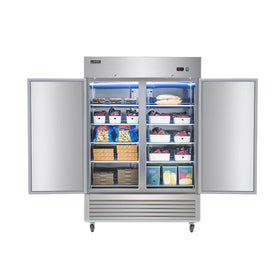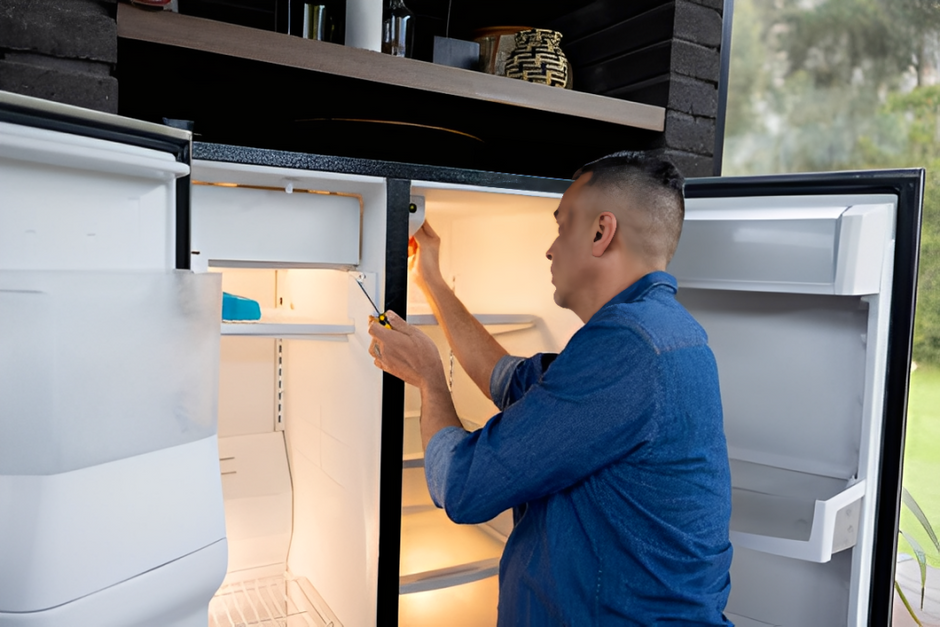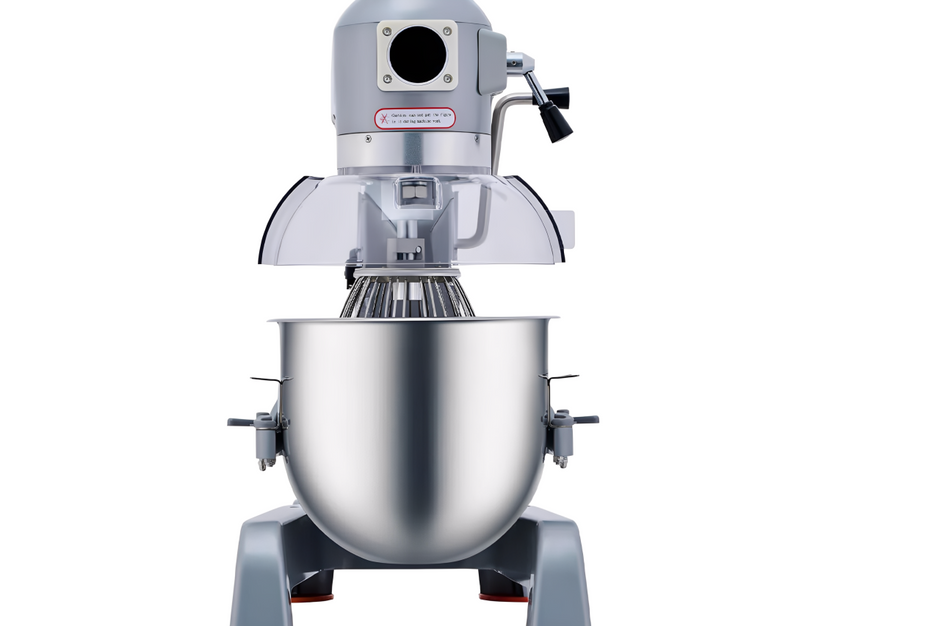Frozen olive oil can appear cloudy, thick, or have the appearance of white flakes: if you are not aware, you might mistake it for spoiled. But it's normal. If frozen properly, olive oil can last up to 2 years frozen, but it's best to rotate stock within 12–18 months for flavor.
When it comes to storing olive oil—especially if you buy it in bulk—you might be wondering: Can you freeze olive oil? Does it go bad? How long does it last once opened?
We are walking you through everything you need to know about freezing, storing, and checking the freshness of olive oil—plus a few technical facts you probably didn’t know.
Can You Freeze Olive Oil?
You absolutely can freeze olive oil, and it’s one of the best ways to preserve it if you don’t use it often or want to store it long-term.
- When olive oil is frozen or chilled, it solidifies and turns cloudy and thickens. This change in appearance is normal and does not mean the oil has spoiled.
In fact, this transformation is a helpful indicator that you're working with real olive oil, especially extra virgin olive oil.
At What Temperature Does Olive Oil Freeze
Olive oil doesn’t freeze solid like water, but it starts to thicken and eventually solidify at lower temperatures between 10°F to 20°F (-12°C to -6°C), depending on the variety and purity.
- In a standard refrigerator (around 37°F or 3°C), most olive oils will freeze and turn cloudy or semi-solid.
The higher the quality and purity of the oil, the more likely it is to freeze or solidify when cold, so yes, freezing is one way to test whether your olive oil is authentic (though not foolproof).
Does Extra Virgin Olive Oil Freeze?
Extra virgin olive oil (EVOO) freezes just like regular olive oil, and it may freeze faster or more completely due to the presence of natural compounds like plant waxes, polyphenols, and oleic acid. These contribute to EVOO's antioxidant profile but also impact how it behaves at low temperatures.
If you place EVOO in the fridge or freezer:
- It may develop white flakes (from waxes).
- It may become cloudy or even semi-solid.
- It returns to its normal state once brought back to room temperature.
This is all completely normal and safe.
How to Freeze Olive Oil the Right Way
Freezing olive oil is relatively simple: you can freeze it in ice trays or in small containers, depending on whether you are freezing just the olive oil
If you are freezing olive oil with herbs like garlic or chili flakes, freeze it in an ice tray. It is always advisable to do a little prep before you put it in the freezer.
Here are two great methods depending on how you plan to use it:
Method#1. Freeze in Ice Cube Trays
- Pour olive oil into a silicone ice cube tray.
- Add herbs, garlic, or chili flakes if you'd like flavored oil cubes.
- Freeze until solid, then transfer to a labeled airtight container or freezer bag.
- Use cubes directly in pans or soups—no thawing needed.
Method# 2. Freeze in Small Containers
- Choose freezer-safe glass or plastic containers with airtight lids.
- Leave ½ inch of space at the top to allow for expansion.
- Label each container with the freeze date.
- Store for up to 1–2 years. Thaw at room temperature before use.
Does Olive Oil Expire?
Yes, olive oil does expire—even though it won’t spoil like milk or meat, it oxidizes over time. This means the fats break down due to light, heat, and air exposure, eventually making the oil taste stale, bitter, or flat.
How to Know if Olive Oil Has Gone Bad
- Smells like crayons, playdough, wax, or old peanuts.
- Tastes greasy or sour instead of peppery, fresh, or fruity.
- Looks darker than usual, but appearance alone isn’t a reliable test.
Rancid olive oil isn’t dangerous to consume, but it does lose all its flavor and nutritional benefits, especially antioxidants like polyphenols and vitamin E.
How Long Does Olive Oil Last?
- Unopened olive oil lasts about 18-24 months if you store it in a cool, dark place.
- After opening, olive oil can last about 3-6 months if you keep the cap tightly sealed to reduce oxidation.
How to Store Olive Oil for Maximum Freshness
To keep your olive oil tasting great, store it the right way:
| Do This | Avoid This |
| Keep it in a cool, dark cupboard | Leaving it near heat sources or in sunlight |
| Use dark glass, stainless steel, or ceramic bottles | Storing in clear plastic or glass |
| Always seal tightly after use | Leaving the cap loose or off |
| Freeze or refrigerate if storing long-term | Heating and cooling the same bottle repeatedly |
Freezing Olive Oil In Bulk
If you are freezing olive oil for use in a restaurant or food business, you need a commercial refrigerator. Reach-in commercial refrigerators provide enough capacity and are built for the rigors of daily commercial kitchen use.
Display commercial refrigerators are ideal if you are freezing olive oil for sale.
Storing Olive Oil in a Commercial Refrigerator?
Step#1. Use Freezer-Safe Containers
- Choose food-grade glass, BPA-free plastic, or stainless steel containers.
- Avoid thin plastic bottles—they can crack or leach chemicals when frozen.
- Always leave headspace (1 inch or more) for expansion.
Step#2. Divide into Smaller Portions
- Even if freezing in bulk, it’s better to store in 1-cup to 1-quart containers instead of one giant drum.
- Smaller portions are easier to thaw and use without repeated temperature changes.
Step#3. Label Everything
- Include the freezing date and type of oil (e.g., EVOO, infused, etc.).
- Olive oil can last up to 2 years frozen, but it's best to rotate stock within 12–18 months for flavor.
Step#4. Prevent Light and Air Exposure
- Use opaque containers or wrap clear containers in foil.
- Remove as much air as possible before sealing to slow oxidation.
Tips for Thawing Frozen Olive Oil
- Let it thaw at room temperature for several hours or overnight.
- Do not microwave—uneven heating can degrade the oil.
- If you froze it in silicone trays, use cubes directly in hot pans or sauces.
Summary of Everything You Need to Know About Freezing and Storing Olive Oil
| Question | Quick Answer |
| Can you freeze olive oil? | Yes – it’s safe and helps preserve freshness |
| Does olive oil freeze? | Yes – it thickens and solidifies below 20°F |
| Does EVOO freeze? | Yes – due to natural plant waxes |
| Does olive oil expire? | Yes – use within 12–24 months, depending on storage |
| How long does it last once opened? | 3–6 months best quality, up to 1 year max |
| How long in the fridge? | Indefinitely safe, but best flavor within 6–12 months |
| How to freeze olive oil? | Use ice cube trays or small airtight containers |
Final Thoughts
Freezing and properly storing olive oil isn’t just possible—it’s smart. If you’re investing in high-quality oils, freezing portions can help maintain flavor, prevent waste, and save money. Just remember: cold temps may change the oil’s appearance, but not its quality.
Now that you know how to freeze, store, and test your olive oil, you’ll never have to second-guess your pantry staples again.
Related: Can You Freeze Hummus?










